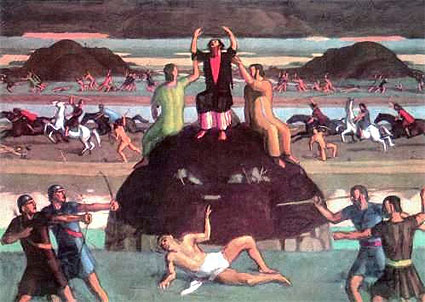Mar
17
2011
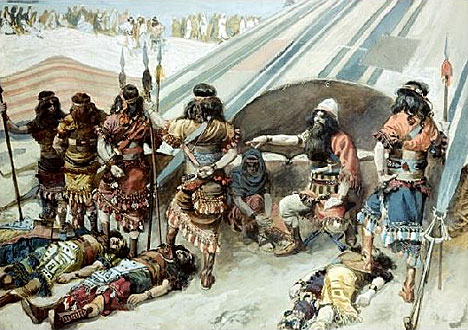
or OH&S in Eden
I mentioned in a post the other day that silver is bridal, and that silver was relegated to the tent poles, the outer court, until the Tabernacle died, was resurrected and transfigured into the Temple of Solomon. [1] The reason was that the Sanctuary was the King’s Court, a place that was not safe for criminals. It demanded that justice be satisfied with a constant presentation of fresh blood.
Continue reading
Comments Off | tags: Baptism, Circumcision, Deuteronomy, Genesis, Joshua, Resurrection, Silver, Solomon, Tabernacle, Table of Showbread, Temple | posted in Biblical Theology, Creation
Dec
29
2010
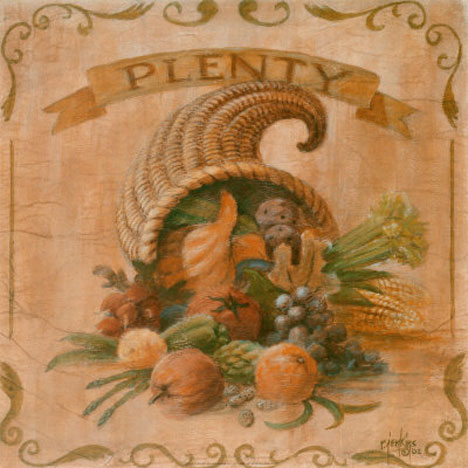
The Table on God’s Mountain
“Most assuredly, I say to you,
unless a grain of wheat
falls into the ground
and dies,
it remains alone;
but if it dies,
it produces much grain.”
John 12:24
Israel was given a “firstfruits” taste of the Promised Land in Numbers 13. As with all Covenants, it was bittersweet. There were grapes, but there were giants. It was the same challenge as the one given to Adam. They were called to be judges who made their decisions based not on sight, but on faith in God’s Words.
Continue reading
Comments Off | tags: Isaiah, Joshua, Numbers, Peter Leithart, Zechariah, Zerubbabel | posted in Bible Matrix, Biblical Theology, The Last Days, The Restoration Era
Oct
6
2010
The Fruitful Field
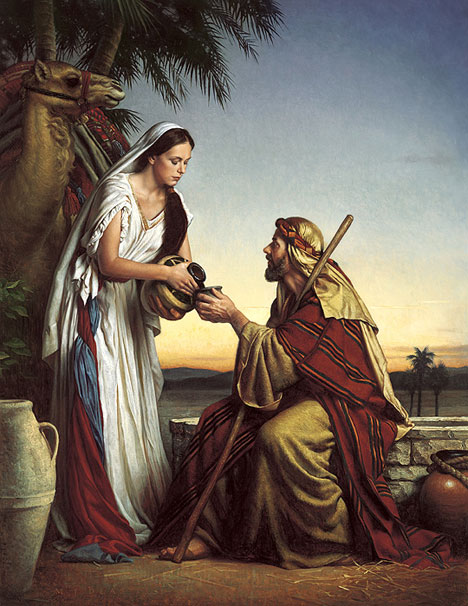
“For I am jealous for you with godly jealousy. For I have betrothed you to one husband, that I may present you as a chaste virgin to Christ.” 2 Cor 11:2
Women are Complex
In Eden, as priest to Eve, Adam’s role was to continually bring her to the Father. She was put “below” Adam in the hierarchy. As the first approach of the High Priest on the Day of Covering — with the blood of a bull — Adam would present himself, standing before God as Mediator (head):
F A T H E R > < S O N + B R I D E
Adam’s job was to bring Eve “between” as the fruit, the evidence, of Covenant relationship. By being faithful to the law, he would open and maintain a clean, safe, Holy Place — a firmament — a house for the bride. The second approach of the High Priest was to cover the body, the nation. In this, he presented the blood of the first goat as the faithful bride (goat hair, symbolising the Lord’s cloud of “bridal” glory, covered the Tabernacle). Like the glory between the Father and the Son in heaven, a glorious Eve was both the fruit of Adam’s obedience, and her future fruitfulness a gift from Father to Son:
F A T H E R > B R I D E < S O N
We see this imaged in the search for and presentation of godly Covenant brides in Genesis. Eliezar and Jacob seek brides for presentation to the Covenant fathers.
Continue reading
Comments Off | tags: Ark of the Covenant, Atonement, Baptism, cherubim, Circumcision, Covenant Theology, Genesis, Joshua, Marriage, Revelation, Satan, Systematic typology, Tabernacle | posted in Bible Matrix, Biblical Theology, Creation
May
3
2010
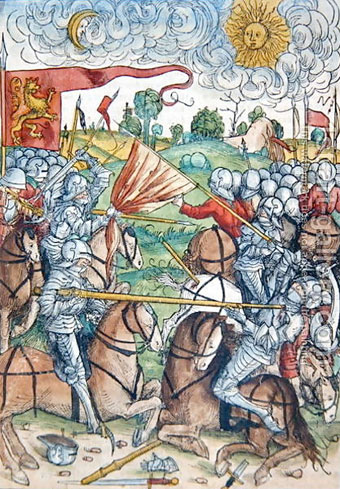
“Blessed are the meek, For they shall inherit the Land.” (Matthew 5:5)
Some more thoughts related to Walking on Water. Please read Joshua 3 before proceeding.
If the New Jerusalem is the fulfilment of the “wall of water” at the Jordan crossing, the Lamb at the centre of the city is the Ark in the middle of the riverbed, surrounded by a human government. [1] If you know your James Jordan, the Ark of the Covenant was an image of the Light that shone on Day 1. The Lamb remains at the centre of the city, surrounded by the firstfruits saints, until the last saint is redeemed and Christ hands the kingdom to the Father.
Continue reading
Comments Off | tags: Against Hyperpreterism, Ark of the Covenant, Atonement, Communion, Hezekiah, James Jordan, Joshua, Melchizedek, Resurrection, Revelation, Satan | posted in Against Hyperpreterism, Biblical Theology, The Last Days
Dec
15
2009
Blood Shed for Bloodshedders
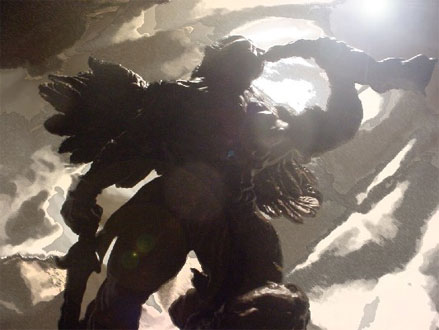
“Now thanks be to God who always leads us in triumph in Christ, and through us diffuses the fragrance of His knowledge in every place. For we are to God the fragrance of Christ among those who are being saved and among those who are perishing. To the one we are the aroma of death leading to death, and to the other the aroma of life leading to life.” 2 Cor. 2:14-16
For those who questioned whether the image of Day 5′s swarms corresponds to the clouds of incense as armies of God, Paul himself does it in 2 Corinthians 2.[1] The saints are soldiers who wield the two-edged sword of the gospel. It brings both life and death, depending on whether those warned respond like Rahab or not. Which brings me to my point.
Doug Wilson recently posted about the sacraments being promises of salvation.
“Every sacrament, by definition, contains and manifests a promise of salvation. That is what a sacrament is. The sacrament of baptism contains a promise of salvation at its inception, and the Supper contains a promise of salvation related to perseverance. What God began God will complete. These promises are apprehended with the heart, whenever someone receives them in faith.”
There is much he wrote that I agree with, but what he said highlighted the major difference between paedo- and credobaptism. Here’s my response for what it’s worth. It does repeat some things I have posted elsewhere here, but it might make my position clearer to some, and the reasons for it. It’s not an argument I’ve seen used by credobaptists, so it might be of interest to you. Continue reading
3 comments | tags: Baptism, Doug Wilson, Joshua, Systematic typology | posted in Biblical Theology
Dec
3
2009
or Weeping over Jerusalem
 Then Jerusalem, all Judea, and all the region around the Jordan went out to him and were baptized by him in the Jordan, confessing their sins. But when he saw many of the Pharisees and Sadducees coming to his baptism, he said to them, “Brood of vipers! Who warned you to flee from the wrath to come? “Therefore bear fruits worthy of repentance, ”and do not think to say to yourselves, ‘We have Abraham as father.’ For I say to you that God is able to raise up children to Abraham from these stones.” —Matthew 3:5-9
Then Jerusalem, all Judea, and all the region around the Jordan went out to him and were baptized by him in the Jordan, confessing their sins. But when he saw many of the Pharisees and Sadducees coming to his baptism, he said to them, “Brood of vipers! Who warned you to flee from the wrath to come? “Therefore bear fruits worthy of repentance, ”and do not think to say to yourselves, ‘We have Abraham as father.’ For I say to you that God is able to raise up children to Abraham from these stones.” —Matthew 3:5-9
Then, as He was now drawing near the descent of the Mount of Olives, the whole multitude of the disciples began to rejoice and praise God with a loud voice for all the mighty works they had seen, saying: ” ‘Blessed is the King who comes in the name of the LORD!’ Peace in heaven and glory in the highest!” And some of the Pharisees called to Him from the crowd, “Teacher, rebuke Your disciples.” But He answered and said to them, “I tell you that if these should keep silent, the stones would immediately cry out.” —Luke 19:37-40
The Bible is consistent with its symbols, so what is it with stones crying out? Continue reading
Comments Off | tags: Abel, Cain, Elijah, Exodus, Hebrews, John the Baptist, Joshua, Lot, Moses, Resurrection, Toby Sumpter, Uri Brito | posted in Biblical Theology, Quotes, The Last Days
Nov
27
2009

or New Covenant Stunt Double
Doug Wilson wrote something recently to correct our misunderstanding of Jesus’ temptation in the wilderness:
When our Lord was tempted by the devil in the wilderness, He answered with Scripture, as we all know. Three times He was tested, and each time He replied in the words of Deuteronomy. But this is sometimes misunderstood. We tend to think that Jesus was quoting Scripture at the devil, as though the devil ought to start obeying it. But this was not His intent. When the Lord cited the words of Moses, each time it was because He would have been disobeying the text of Scripture if He had followed the suggestion of the tempter.
Continue reading
Comments Off | tags: Achan, Joshua, Nazirite, Peter Leithart, Tabernacle, Table of Showbread | posted in Biblical Theology, The Restoration Era
Oct
26
2009

Daniel was taken to Babylon before the destruction of Jerusalem. As the ruler over the king’s advisors, it is highly likely he was involved in the razing of Jerusalem.
The Lord sent Joseph into Egypt as a forerunner, established his house and integrated the old house of Jacob into it. Pharaoh was converted under the ministry of Joseph, humbled himself before Jacob and requested a blessing.
The Lord did the same thing with Daniel. A new house was being established in Babylon before the final demolition of the old Temple. Daniel ascended as “firstfruits”. He stood on the mountain of God as Abraham, as Moses. At the right hand of the power he would bring the curses of the Law raining down upon the Covenant breakers. As Abraham bargained with God, perhaps the mercy shown to Judah’s poor was the work of Daniel.
Continue reading
Comments Off | tags: Babylon, Bible Matrix, Cyrus, Daniel, Esther, Ezekiel, Haggai, Haman, Joshua, Mordecai, Nebuchadnezzar, Zerubbabel | posted in Biblical Theology, The Restoration Era
Sep
22
2009
or Understanding Dominion by Covenant

The New Covenant is not about salvation. It is about dominion. Before you call in the inquisitors, have a look at this diagram from my book:
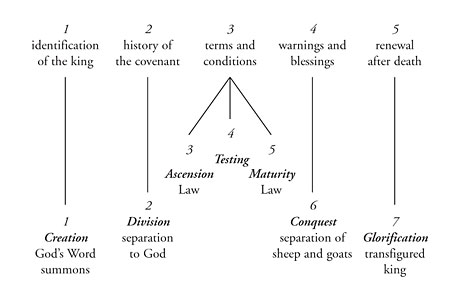
Continue reading
Comments Off | tags: AD70, Caleb, Covenant Theology, Dominion Theology, Feasts, Firstfruits, Gnosticism, Joshua, Judges, Moses, Passover, Postmillennialism, Ray Sutton, Revelation, Solomon | posted in Against Hyperpreterism, Biblical Theology, Christian Life, The Last Days, Totus Christus








